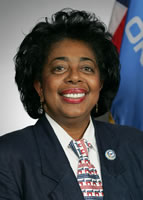In order to provide equal access and equal opportunity to people with diverse abilities, this site has been designed with accessibility in mind. Click here to view
Sen. Eason McIntyre Says Faith Got Her Through Breast Cancer; Urges Women to Get Screened
 Senator Judy Eason McIntyre
Senator Judy Eason McIntyre
State Senator Judy Eason McIntyre had always been careful to have an annual mammogram, and had always gotten a clean bill of health—until this past August. When she saw the cluster of white flecks on the mammogram image, she knew something was wrong. A couple of weeks later a biopsy confirmed it was cancer.
“Emotionally, I went from shock, fear, denial, a feeling of helplessness…I started really thinking funeral plans,” said Eason McIntyre.
But the Tulsa senator soon turned her energy and emotions into approaching the cancer pro-actively. She read everything she could about breast cancer and talked to women who had lived through it—and she turned to her faith.
“While the physicians and everyone related to the medical team can do wonders…at least for me, if I didn’t give it to a higher being, I would probably swim in the same negative thoughts over and over again which will not do you any good during this process,” Eason McIntyre said. “I put it in the hands of the good Lord.”
Eason McIntyre first underwent a lumpectomy, but learned the cancer was invasive, which meant a mastectomy would be needed. Once again, she opted for a pro-active approach.
“I had already decided that if the cancer was invasive, I would have the other breast removed as well, rather than risk the cancer returning,” Eason McIntyre said. That was three weeks ago. Recovering at home, Eason McIntyre said she felt “just great” and was looking forward to returning to the Capitol.
Because she opted for the double mastectomy and the cancer had not spread to the lymph nodes, Eason McIntyre will not have to undergo chemotherapy or radiation treatments. However, she will be on a five-year regime of the medication Tamoxifen to help keep her cancer-free. Now Eason McIntyre wants to use her experience to help other women
“I really see this as an opportunity to help other women who are afraid and let them know they can get through this,” Eason McIntyre said. “I want women to know even though they may be frightened, early detection can save their lives.”
 Oklahoma Senate
Oklahoma Senate

